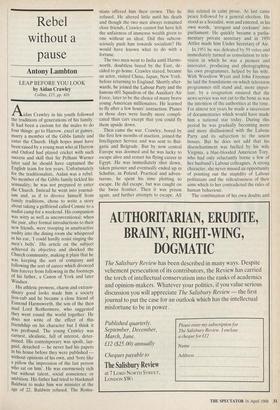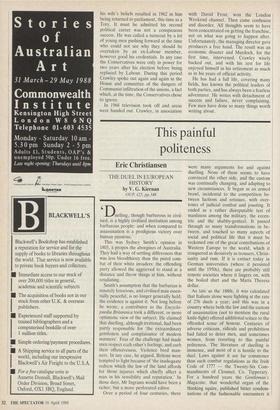Rebel without a pause
Antony Lambton
LEAP BEFORE YOU LOOK by Aidan Crawley
Collins, f15, pp. 416
Aidan Crawley in his youth followed the traditions of generations of his family. It had been a custom for the males to do four things: go to Harrow, excel at games, marry a member of the Gibbs family and enter the Church. High hopes must have been raised by a young man who at Harrow and Oxford had played cricket with such success and skill that Sir Pelham Warner later said he should have captained the English team for ten years. Unfortunately for the traditionalists, Aidan was a rebel. No member of the Gibbs family tickled his sensuality; he was not prepared to enter the Church. Instead he went into journal- ism and, as if to divorce himself from family traditions, chose to write a story about taking a girlfriend called Connie to a nudist camp for a weekend. His companion was witty as well as unconventional; when the pair, after formal introductions to their new friends, were trooping in unattractive nudity into the dining room she whispered in his ear, 'I could hardly resist ringing the men's bells'. His article on the subject achieved its objective and shocked the Church community, making it plain that he was keeping the sort of company and following the sort of career which divorced him forever from following in the footsteps of his father, a Canon of York and later Windsor.
His athletic prowess, charm and extraor- dinary good looks made him a society lion-cub and he became a close friend of Esmond Harmsworth, the son of the then mad Lord Rothermere, who suggested they went round the world together. He does not write of the effect of this friendship on his character but I think it was profound. The young Crawley was earnest, idealistic, full of interest, deter- mined. His contemporary was spoilt, lan- guid, detached — he never had his papers in his house before they were published without opinions of his own, and 'bore like a pillow the impression of the last person who sat on him'. He was enormously rich but without talent, social conscience or ambition. His father had tried to blackmail Baldwin to make him war minister at the age of 22. Baldwin refused. The Roina-
nians offered him their crown. This he refused. He altered little until his death and though the two men always remained close friends, Crawley cannot but have felt the unfairness of immense wealth given to one without an ideal. Did this subcon- sciously push him towards socialism? He would have known what to do with a fortune.
The two men went to India until Harms- worth, doubtless bored by the East, de- cided to go home. Crawley stayed, became an actor, visited China, Japan, New York, before returning to England. Shortly after- wards, he joined the Labour Party and the famous 601 Squadron of the Auxiliary Air Force, later to be the choice of many brave young American millionaires. He learned to fly after a few hours' instruction. Planes in those days were hardly more compli- cated than cars except that you could fly them upside down.
Then came the war. Crawley, bored by the first few months of inaction, joined the Intelligence Service and was sent to Bul- garia and Belgrade. But by now central Europe was doomed and, he was lucky to escape alive and restart his flying career in Egypt. He was immediately shot down, taken prisoner and eventually ended up in Schubin, in Poland. Practical and adven- turous, he spent his time plotting to escape. He did escape; but was caught on the Swiss frontier. Then it was prison again, and further attempts to escape. All
this related in calm prose. At last came peace followed by a general election. He stood as a Socialist, won and entered, in his own words, 'arrogant and cocksure' into parliament.• He quickly became a parlia- mentary private secretary and in 1950 Attlee made him Under Secretary of Air.
In 1951 he was defeated by 59 votes and immediately .turned as consolation to tele- vision in which he was a pioneer and innovator, producing and photographing his own programmes, helped by his wife. With Woodrow Wyatt and John Freeman he laid the foundations on which television programmes still stand and, more impor- tant, by a resignation ensured that the news service was not cut to the bone as was the intention of the authorities at the time. For almost ten years he made a succession of documentaries which would have made him a national star today. During this period he was gradually becoming more and more disillusioned with the Labour Party and its subjection to the union bosses. But he does not add that his disenchantment was fuelled by his wife Virginia, a blue-blooded American Tory, who had only reluctantly borne a few of her husband's Labour colleagues. A strong character, she never missed an opportunity of pointing out the stupidity of Labour politicians and the ridiculousness of their aims which to her contradicted the rules of human behaviour.
The combination of his own doubts and
his wife's beliefs resulted in 1962 in him being returned to parliament, this time as a Tory. It must be admitted his second political career was not a conspicuous success. He was called a turncoat by a lot of young men pushing forward at the time who could not see why they should be overtaken by an ex-Labour member, however good his credentials. In any case the Conservatives were only in power for two years after his election before being replaced by Labour. During this period Crawley spoke out again and again in the House and committee of the dangers of Communist infiltration of the unions, a fact which, at the time, the Conservatives chose to ignore.
In 1968 television took off and areas were handed out. Crawley, in association with David Frost, won the London Weekend channel. Then came confusion and disorder. All thoughts seem to have been concentrated on getting the franchise, not on what was going to happen after. Unfortunately, the managing director gave producers a free hand. The result was an economic disaster and Murdoch, for the first time, intervened. Crawley wisely backed out, and with his zest for life enjoyed himself in his retirement as much as in his years of official activity.
He has had a full life, covering many fields, has known the political leaders of both parties, and has always been a fearless adventurer. He writes with detachment of success and failure, never complaining. Few men have done so many things worth writing about.































































 Previous page
Previous page